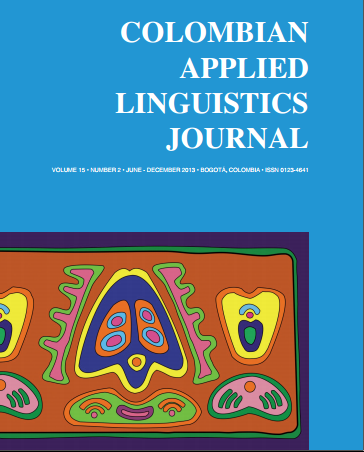DOI:
https://doi.org/10.14483/udistrital.jour.calj.2013.2.a04Publicado:
2013-07-01Número:
Vol 15, No 2 (2013) July-DecemberSección:
Artículos de InvestigaciónWorking by projects: a way to enrich critical thinking and the writing process in a third grade eflclassroom
Trabajo por proyectos: pensamiento crítico y proceso escritural en inglés en un salón de tercero de primaria
Palabras clave:
Pensamiento crítico, Trabajo por proyectos, Habilidades de escritura (es).Palabras clave:
Critical thinking, Project work, writing skills (en).Descargas
Resumen (en)
This document presents the result of a qualitative action research developed with thirty-three third grade students at a public school in Bogota. This action research aimed at describing and analyzing the role of project work in the development of critical thinking in third grade EFL students and to describe and document the way in which those students developed their writing skills through this methodology. The participants developed different inquiries related to topics they were interested in exploring and related to the recycling project of the school. The data were collected during eleven sessions carried out along eight months through field notes, artifacts, and audio recordings. The results show that through project work the students enhanced their emerging critical thinking skills and their writing process; improved their interactions with their classmates, discovered that learning English was something useful for their lives, and therefore they acquired more confidence in writing and speaking in English. Additionally, they became more reflective, organized and critical about what they think, what they say, and about what happens around them.
Resumen (es)
Este documento presenta el resultado de una investigación-acción cualitativa desarrollada con treinta y tres estudiantes de grado tercero de un colegio público de Bogotá. Esta investigación-acción tuvo como objetivo describir, analizar y documentar el papel del trabajo por proyectos en el desarrollo del pensamiento crítico en los estudiantes de inglés como lengua extranjera del grado tercero; y la manera a través de la cual dichos estudiantes desarrollaron sus habilidades en escritura a través de esta metodología. Los participantes llevaron a cabo diferentes investigaciones relacionadas con temas de su interés en torno al proyecto de reciclaje del colegio. Los datos fueron recolectados durante once sesiones a lo largo ocho meses a través de notas de campo, producciones escritas de los estudiantes y grabaciones de audio. Los resultados mostraron que a través del trabajo por proyectos los estudiantes cualificaron sus habilidades de pensamiento crítico emergentes y su proceso de escritura, mejoraron las interacciones con sus compañeros de clase, descubrieron que el aprendizaje de inglés era algo útil para sus vidas y por consiguiente, adquirieron más confianza para hablar y escribir en inglés. Además, las participaciones se hicieron más reflexivas, organizadas y críticas en relación con lo que piensan, lo que dicen y lo que sucede a su alrededor.
Referencias
Baynham, M. (1995).Literacy practices: Investigating
literacy in social contexts. New York, NY: Longman.
Bloom’s revised taxonomy. Retrieved June 5, 2011,
from http://www.nwlink.com/~donclark/hrd/bloom.
html.
Burns, A. (2003). Collaborative action research for
English language teachers.Cambridge: Cambridge
University Press.
Cuspoca, J. (2002). Project work in early literacy in an
EFL context.(Thesis, Master Program in Applied
Linguistics for the Teaching of English as a Foreign
Language). Bogotá: Universidad Distrital Francisco
José de Caldas.
Davis-Seaver, J., & Davis, J. (2000). Critical thinking in
young children.Canada: The Edwin Mellen Press.
Dresden, J., & Lee, K. (2007). The effects of project work
in a first-grade classroom: A little goes a long way.
Retrieved July 24, 2011 from http://ecrp.uiuc.edu/
v9n1/dresden.html.
Freeman, D. (1998). Doing teacher research: From inquiry to understanding. Boston, MA: Heinle & Heinle
Publishers.
Harris, J., & Katz, L. (2010).Young investigators: The
project approach in the early years. Washington:
Columbia University.
Hyland, K. (2009). Teaching and researching writing(2
a
ed.). London: Longman.
Lillis, T. M. (2001). Student writing: Access, regulation,
desire. New York, NY: Routledge.
Martinez, E. (2007). Fostering actions of competence
broadening higher order thinking skills as a basis for
standardized test-taking. How:A Colombian journal
for teachers of English,14, 27-57.
Merriam, S. (1998). Qualitative research and case study
applications in education. San Francisco: JosseyBass.
Moore, B., & Stanley, T. (2009). Critical thinking and
formative assessments: Increasing the rigor in your
classroom.Larchmont, NY: Eye of education.
Murray, D. (2003). Teach writing as a process not product. Retrieved October 25, 2011, from http://www.
willamette.edu/gse/owp/docs/TeachWritingasaProcessNotProduct.pdf.
Patton, M. (2002). Qualitative research & evaluation
methods.Retrieved September 14, 2011, from http://
es.scribd.com/doc/44478053/Patton-2002-Qualitative-Research-and-Evaluation-Methods-3e.
Paul, R., & Elder, L. (2005). The miniature guide to critical thinking concepts and tools.Dillon Beach CA:
Foundation for Critical Thinking.
Ramirez ,L. Comunicación y Discurso. La perspectiva
polifónica en los discursos literario, cotidiano y
científico.Bogotá, Colombia: Editorial Magisterio.
Richards, J., & Renandya, W. (2002). Methodology in
language teaching: An anthology of current practice.
New York: Cambridge University Press.
Rinnert, C., & Kobayashi, H. (2009).Writing in foreign
language contexts. Learning, teaching and research.
Canada.
Rodríguez, M. (2001).Antología de proyectos pedagógicos. Cuaderno de trabajo Nº 2. Bogotá: Universidad
Distrital Francisco José de Caldas.
Ruiz, N. (2003). Kidwatching and the development of
children as writers.Profile 4, 52-57.
Silva, T. (1993). Toward an understanding of the distinct
nature of L2 writing: The ESL research and its implications.TESOL Quarterly, 27, 657-677.
Working by projects: A way to enrich critical thinking and L2 writing
Ruiz S., (2013) Colomb. Appl. Linguist. J.
ISSN 0123-4641 • Bogotá, Colombia. Pages 205 - 220 220 220
Stoller, F. (2000). Project Work: A means to promote
language and content.New York: Cambridge: University Press.
Wallace, M. (2006). Action research for language teachers.Cambridge: Cambridge University Press.
White, R., & Arndt, V. (1991). Process Writing.London:
Longman. Retrieved August 22, 2011 from http://
www.buowl.boun.edu.tr/teachers/PROCESS%20
WRITING.htm.
Cómo citar
APA
ACM
ACS
ABNT
Chicago
Harvard
IEEE
MLA
Turabian
Vancouver
Descargar cita
Métricas
Licencia
Esta publicación tiene licencia de Creative Commons Reconocimiento-No comercial- Sin obras derivadas 2.5 Colombia. El lector podrá leer, copiar y distribuir los contenidos de esta publicación bajo los términos legales de Creative Commons, Colombia.
Para mayor información referirse a http://creativecommons.org/licenses/by-nc-nd/2.5/co/








